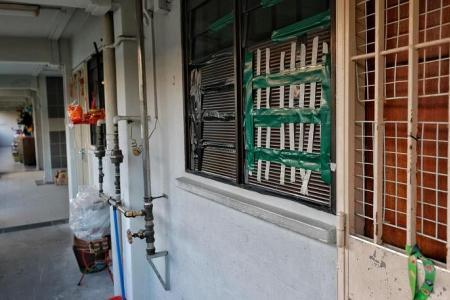Housewife accused of hoarding cats in rental flat says she and rescuers working to rehome felines
A housewife, who was accused of hoarding and abandoning more than 40 cats in her rental flat in Ang Mo Kio, said she has been working with several cat rescuers and the Cat Welfare Society (CWS) since April to find her pets new homes.
They managed to rehome 14 cats, said Ms Raihana, 34, who wanted to be known by a single name for fear of reprisal. The rest are still in her fifth-storey flat, which her family is currently not living in.
She said she had also made three police reports against some of the cat feeders, whom she said pried open the louvres of her sealed windows and took a few of her cats.
Her case was brought to light in late March when a reddit user Due-Marsupial4609 posted that there were “50+ cats trapped in the unit with no owner in sight, and (the) authorities had refused to help”, and that the stench from the flat was unbearable.
Neighbours on the same floor confirmed this when they told The Straits Times that they could smell the odour from that unit from their own homes, and that they would hold their breath whenever they walked past the flat.
Ms Raihana, her husband and their three children are now staying with a relative.
She said she had to leave the cats in the rental flat in April after a neighbour called child protection services on her, accusing her of jeopardising the health of her newborn as they were living in “less than healthy environment with 40 cats”.
“The officers came, and we had to move for the sake of my baby. She was born in December and had not had all her vaccinations then,” she said.
The most common disease a baby could get from cats is toxoplasmosis – a common parasitic infection that is usually harmless but can cause serious problems in some people, particularly pregnant women, newborns and people with weak immune systems. If the inner eye tissue gets infected and is left untreated, this could result in blindness.
An independent cat rescuer who gave her name only as Ms Wati, 50, said she was tipped off in April that the cats had been left without human supervision in the flat.
She said she was working with feeders in the area and the Society for the Prevention of Cruelty to Animals (SPCA) to have the cats removed from the flat and rehomed, “but the owner was uncooperative”.
An SPCA spokesman said it was first alerted to the case on March 31 and contacted Ms Raihana to offer its support.
“The SPCA had provided options for rehoming the cats and veterinary assistance to ensure the cats’ well-being. Regrettably, despite our efforts, we have encountered challenges in making progress on this matter.
“The resident has not yet agreed to surrender the cats to the SPCA for rehoming, nor have we been allowed to intervene directly,” she said, adding that the organisation does not have enforcement powers to take someone’s pets away without his or her consent.
“Given the situation and the potential risks to the cats, we have escalated the case to the appropriate authorities. We hope that they will be able to address the concerns raised and ensure the safety and welfare of all involved parties,” she added.
Ang Mo Kio community cat feeder Crystal Tan, 60, said she received a message in April alleging that the cats in the flat had not eaten in two weeks.
“I was so heartbroken when I heard that, that I went over with some food... When I got closer to the flat, the cats were meowing loudly in hunger,” she said.
But Ms Raihana disputed this. “But my husband goes to feed the cats every day and washes the place twice a week. So we did not abandon the cats,” she said.
She said the feeders were caught on a neighbour’s CCTV footage on several occasions prising open the louvres of the windows and removing a few of her cats.
She said she made three police reports over this, but did not say how many cats were taken.
“I don’t understand why, instead of trying to help me with my situation, they break into my place to steal the cats. All of my cats have been microchipped under my name and this address,” she added.
Ms Raihana said AVS was notified in April of the situation and had given her time to rehome her cats with the help of rescuers and CWS.
“We have managed to rehome 14 of my cats and are working to rehome more,” she said.
ST has contacted AVS and the Housing Board for comment.
Rescuers say they have encountered more pets hoarding cases this year, including a Pipit Road rental flat resident who left about 40 cats behind without food and water after vacating the unit.
Those found guilty of failing in their duty of care to their pets, including abandoning them, can be charged under the Animals and Birds Act.
Psychiatrist Adrian Wang said animal hoarding is a complicated issue and has been linked to mental illnesses like obsessive compulsive disorder and schizophrenia.
“The person gets relief from anxiety and depression from their cats, and believes they are in the best position to care for them, despite the overwhelming evidence against this. They often reject help from others and can be combative when challenged.
“Treatment is difficult because the person believes they are not doing anything wrong, so enforcement authorities usually have to step in,” he said.
Get The New Paper on your phone with the free TNP app. Download from the Apple App Store or Google Play Store now


